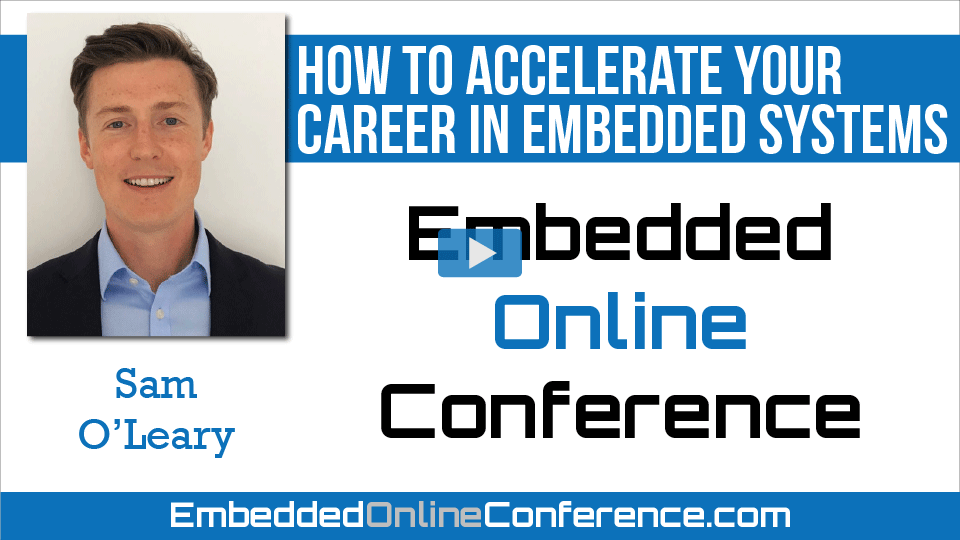Home > On-Demand Archives > Theatre Talks >
How to Accelerate your Career in Embedded Systems
Sam O'Leary - Watch Now - EOC 2020 - Duration: 34:13

Moving forward in your career is harder than it used to be. People are changing jobs more regularly and no longer rely on traditional career paths to progress into higher-level positions. Understanding what is important to you and how to use those goals to progress professionally is often an underrated component of building a fulfilling career - even engineers, who are highly logical people, can sometimes neglect this way of thinking!
In this webinar, I will present a high-level overview of the embedded systems employment market, discussing how you can use this readily available information to help plan your career. In the second part, I will provide job searching and interview techniques, specifically tailored for embedded software and electronics engineers.
Nice presentation! What suggestions do you have for an individual who would like to make a change in domain (say from power generation industry to embedded system) in career? It is obvious that the individual doesn't have professional experiences in his/her aspiring domain, but had done few projects by personal interest.
Hi Sam, Thanks for the talk! I am an Electronics graduate currently working as an Embedded Software Engineer. Could you please shed some light on the importance of pursuing Masters/Professional Certificate courses in advancing one's career as an Embedded Software Engineer. Thanks!!
Hi Mustafa, thank you for the kind words! I have answered a similar question below which might be worth looking at. To summarise, I think additional qualifications are always positive and in some situations can give you that edge over another candidate when applying for a job. However, having hands-on experience does seem to hold the highest value from my experience. So planning your career from an early stage and deciding what you would like to specialise in, is equally, if not more so important (in my opinion!)
Got it. Thanks Sam
Don't follow the money, follow what you are passionate about. If you stick with what you love to do, your skills will grow and the money will follow you.
Sure sir will try my best!
Hello. Yes I agree with "wbstvnsn"! Focus your energy on what you are passionate about. If you are passionate about something, it is easy to remain dedicated and highly motivated, which are key attributes to success.
Hi Sam, thanks for the great talk! I have a question regarding professional registration - do you feel that there's much benefit in pursuing engineering chartership these days? I get the impression that companies don't really recognise it as much anymore. Also, are there other professional certifications that you would recommend in order to advance quickly in an embedded systems career. I looked at Professional Software Engineering Master recently with the IEEE but not really sure if it would benefit my career too much. What are your thoughts? Thanks!
Hi there, thanks for watching and the kind words, much appreciated! That is an interesting observation and not the first time I have been asked that question! Most job specifications will list qualifications, such as a Degree or Masters as desirable, but increasingly they are not essential. We tend to find that having hands-on experience is the most valuable commodity these days - the problem is if you don't have the experience how do you get it? There is no easy answer to this, quite often it's a case of being in the right place at the right time rather than a calculated approach. However, there is a lot of readily available information out there and it's not that difficult to find out which company has which tech stack. My advice would be to focus on what you are most passionate about and become an expert in that space.
Hello, thanks for the talk. What do you think about embedded systems engineers with many years or experience and young graduates with less experience but with more trending skills on top of embedded systems i.e full stack web experience, Machine learning etc. Do you think older and more experienced engineers should consider retraining, move into management or identify a niche in the market?
Hello there, thank you for watching. I think that is a really good question but it's difficult to answer as every hiring company will have different specifications and requirements. Employers will usually have a long shortlist of desired skills, but it will come down to the core experiences that they value the most. In some situations it can be very difficult to decide between candidates and that is when some of the niche technologies will come into play. I also think that having the training and having hands-on experience are two very different things, with employers holding the latter in higher regard - It can be difficult to secure a position based purely on classroom experience. My advice would be to figure out what is most important to you, and what you'd like to get out of your career in the next 5-10 years. From there you can start to plan and decide what changes, if any, need to be made.
Hey Sam! I knew people would appreciate your great talk - thanks for your participation! Expect many more to watch it over the course of the next few days. Cheers!
Hi Stephane, thank you! I have really enjoyed the experience and appreciate you and Jacob inviting me to be apart of the conference this year - I think it is a fantastic idea which you have executed brilliantly! Well done!
Thank you Sam! Great advice for anyone at any stage of their career. You presented some good tips that I will definitely implement in my career growth.
Fantastic talk! Thank you. Where are some strategies to improve listening skills that you recommend?
Hi, thanks for the talk! Do you have any tips on getting hired in the UK as an EEU(Norwegian) citizen? I have tried applying for jobs, but my study is not as recognized in the UK as in Norway.
Have you tried Druck in Leicester as there’s a connection to another Baker Hughes site in Norway?
Hi there, without knowing more of the specifics it's quite difficult to advise. I can tell you that there is a high demand for embedded software and electronics professionals within the UK, so if you are struggling to get any traction on applications I would recommend following some of the leading engineering recruitment agencies, as that should increase the number of applications you can make and you may start to get approached about jobs which are not advertised. If you are already doing this, I would recommend reaching out to those agencies and asking them for feedback on why you were not selected for an interview. For example, you may need to re-write your CV or tailor your CV to the requirements of the role. If you'd like to connect with me on LinkedIn, I can try and offer some more specific advice!
Regarding interview processes: in my experience they tend to be short (probably because they are looking to fill a role ASAP) but life experience has taught me that it takes a lot of information to establish a great candidate-company fit. Would it be an "OK" practice to ask form multiple rounds that also include meeting the potential team members, having longer talks? Somehow also conveying the idea that the time is not wasted because a good decision takes time and a lot of information.
Hi again! I think it's a good point and I agree that it's important for both the employer and interviewee to have an in-depth interview to ensure the role, company, culture, etc is a good fit. I also think that interviewing can be a timely and expensive exercise for employers, so being able to streamline the process and make it as efficient as possible has it's benefits, especially during busy or high-pressure periods. So, in my opinion, there is a balance that needs to be found. As the interviewee, it's important to ask the right questions to ensure that there as few uncertainties as possible when starting a new position. I appreciate that this is not always possible, and sometimes the uncertainties can end up being positive, but it's usually the unknown negatives that have the biggest influence. This goes back to understanding your motivations and what you are looking for in a new role, if you are clear on these points and ask the right questions, you should be able to determine whether it's the right position for you in 2 to 3 interview stages.
Hello.. thanks for the session... I have been working in automotive embedded domain for nearly 10 years.. Have achieved recognition and awards for my performance.. But I feel my skills are very specific and if I need to make a transition when looking at jobs outside I do not feel competent enough.. Is there any way you would suggest I can bring out my key qualities (for example quite adept at debugging and troubleshooting) to a recruiter or employer?
In your experience, would recruiters be open to just establishing a connection and keeping in touch over time until a good job match is found?
Absolutely, as a recruiter, I think it is important to build a relationship with the candidates you are representing. Within my network, there are candidates I worked with over 10 years ago that I still keep in touch with.
(Great talk, by the way. Very easy to follow and great advice.)
Thank you!
On the side of approaching people on the internet such as LinkedIn, I was recently considering shamelessly approaching them and stating intentions (information about jobs, companies, just networking, etc.). Is this a "OK" practice or does it needlessly scare people off?
Hi, thanks for watching and the positive feedback! I do not think there is a right or wrong answer to this question, as it will depend on the individual you are approaching, but as a rule of thumb... If a company is advertising or you know they are recruiting I think it is acceptable to make an introduction and state your interest in the position. However, I would not advise approaching people on Linkedin that you do not have a relationship with to request information about jobs. Instead, I would suggest trying to connect with them in the first instance. If you have an interest in a company, I would recommend following them on Linkedin and setting up job alerts, so that you know the best time to get in touch. If the company has an internal recruitment team or HR function you could send your CV with a cover letter to make an introduction, but as I am sure you can appreciate they will receive a lot of speculative approaches so if they are not actively looking for your skillset you may not always receive a response. I hope this helps.
























Nice presentation, thank you!